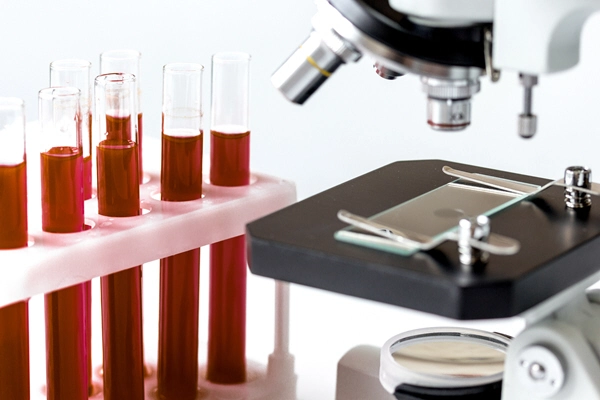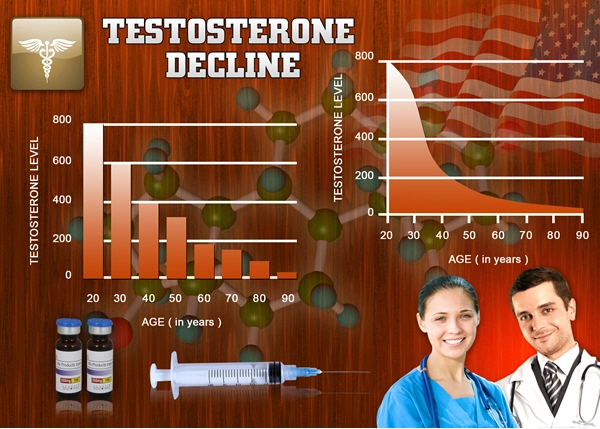 Have you been feeling sluggish and tired lately? Have you been having issues ginning up the willpower to go to the gym or eat healthy? Testosterone Deficiency could be a contributing factor to your woes. While there is increasing awareness of the causes and effects of Low-T, millions of men still struggle with issues related to Hormone Imbalance and have not yet sought out relief.
Have you been feeling sluggish and tired lately? Have you been having issues ginning up the willpower to go to the gym or eat healthy? Testosterone Deficiency could be a contributing factor to your woes. While there is increasing awareness of the causes and effects of Low-T, millions of men still struggle with issues related to Hormone Imbalance and have not yet sought out relief.
The Critical Importance of Testosterone
Testosterone is critical not only to sexual health but psychological health, body composition, strength, immunity, cardiovascular health, and more. Ideally, men should have Testosterone Levels that range from 300-1000 ng/dL—Anything lower results in a diagnosis of Testosterone Deficiency. While Low Libido is the most commonly mentioned symptom of Low-T, many men find that fatigue is the most debilitating symptom. If you've been having trouble getting out of bed and getting things done lately, Testosterone Therapy could provide the aid that you're looking for.
Getting to the Bottom of Low Testosterone
To function at its peak, the human body requires a complex harmony of Hormone Balance. Both internal and external factors can disrupt that balance, leading to issues such as Low-T, HGH Deficiency, Thyroid Insufficiency, Diabetes, and more. The following are some factors that can lead to lower Testosterone and cause you grief:
Men Produce Less Testosterone as They Get Older—This is a major culprit. Males experience a natural cycle of Testosterone Levels throughout their lives. Testosterone peaks during puberty and through early adulthood then plateaus. Starting in the late twenties, however, Testosterone Production slowly begins to drop off. While men aren't guaranteed to have Low-T, they become increasingly likely to experience the condition as they get older. It's estimated that 40% of guys older than 45 will experience Testosterone Deficiency.
Testicular Injury Can Lead to Damage Which Disrupts Testosterone—The testes are responsible for the vast majority of Testosterone secretion in men. If anything traumatic happens to the testicles, there's a chance that it could affect the ability of the testes to release Testosterone. This could be anything from a swift kick to the privates to damage resulting from inflammation or cancer.
Brain injuries and tumors can also lead to Low-T—The pituitary and hypothalamus are intricately involved in the Testosterone regulation and production process—if anything happens to them, it could diminish or stop signaling for important precursor hormones. The pituitary releases Luteinizing Hormone and Follicle-Stimulating Hormone to promote Testosterone and Sperm production, and the hypothalamus releases Gonadotropin-Releasing Hormone to activate the pituitary.
Obesity Suppresses Testosterone—Healthy Testosterone Levels are heavily dependent on maintaining a healthy weight. If you're overweight or obese, you're more likely to have issues with Testosterone. Fat cells are capable of turning Testosterone into Estrogen. The higher your body fat, the faster that your body makes Estrogen. This is why men that are obese experience gynecomastia (colloquially known as man-boobs).
Being Underweight Makes it Harder to Produce Testosterone—Your body has to maintain certain priorities to keep you alive. Avoiding starvation is one of the primary goals of the brain. If you are underweight, your body is going to take resources that would normally be spent on Testosterone and sexual health and divert those resources to survival.
Alcohol, Opiates, and Many Other Drugs Suppress Testosterone—Alcoholism is a very strong factor in Low-T. Drinking too much interferes with the body's ability to produce Testosterone and also disrupts the neurological inputs that lead to erection and orgasm (ever heard of whiskey dick?). Opiates have a powerful negative effect on Testosterone. Ongoing use of opioids like morphine and heroin can cause Testosterone Production to drop precipitously. There are also many medications that cause Testosterone problems, including chemotherapy, statins, beta-blockers, and anti-depressants.
Chronic Illness Trounces Testosterone—Many Chronic Illnesses interfere with the body's natural hormone balance. Chronic Fatigue is a condition in which the body produces an excess of cortisol which is associated with a related decline in Testosterone. Cardiovascular Disease, Arthritis, and Type-2 Diabetes also disrupt Testosterone.

- The Most Common Symptoms of Low Testosterone in Both Old and Young Men [Last Updated On: February 13th, 2025] [Originally Added On: January 23rd, 2021]
- The Results Are In: The Effects of TRT on Men with Prostate Cancer [Last Updated On: January 5th, 2025] [Originally Added On: February 25th, 2021]
- Treating Low Testosterone with Hormone Therapy (TRT): The Fundamentals [Last Updated On: February 16th, 2025] [Originally Added On: April 15th, 2021]
- The Relationship Between Erections and the Estrogen/Testosterone Ratio [Last Updated On: June 2nd, 2025] [Originally Added On: April 15th, 2021]
- Testosterone Levels Main Determining Factor Behind Fracture Risk in Older Men [Last Updated On: March 23rd, 2025] [Originally Added On: April 23rd, 2021]
- Simple Lifestyle Changes to Boost and Naturally Increase Your Testosterone Levels [Last Updated On: February 15th, 2025] [Originally Added On: May 9th, 2021]
- If You Suffer From Low-T, You’re More at Risk for Severe COVID-19 Symptoms [Last Updated On: May 30th, 2025] [Originally Added On: May 30th, 2021]
- Is Male Menopause a Real Thing? Yes, Actually [Last Updated On: May 31st, 2025] [Originally Added On: June 6th, 2021]
- Testosterone Therapy May Have Positive Effects on Non-Alcoholic Fatty Liver Disease [Last Updated On: June 1st, 2025] [Originally Added On: June 30th, 2021]
- Focus on These Five Workouts to Naturally Boost Both HGH and Testosterone [Last Updated On: April 6th, 2025] [Originally Added On: March 16th, 2022]
- Does Every Man Experience Erectile Dysfunction as He Gets Older? [Last Updated On: April 10th, 2025] [Originally Added On: March 25th, 2022]
- The Pros and Cons of Taking DHEA Supplements for Men [Last Updated On: April 11th, 2025] [Originally Added On: April 7th, 2022]
- Avoid These Foods That Reduce Testosterone [Last Updated On: April 16th, 2025] [Originally Added On: June 28th, 2022]
- Tlando: The Super Easy TRT Alternative to Xyosted for Testosterone Deficiency [Last Updated On: April 18th, 2025] [Originally Added On: July 11th, 2022]
- Reasons Why Cialis May Be a Better Option Than Viagra to Treat ED [Last Updated On: April 17th, 2025] [Originally Added On: July 22nd, 2022]
- Testosterone and Estrogen Imbalance May Impair Shoulder Joint Health [Last Updated On: February 9th, 2025] [Originally Added On: August 16th, 2022]
- Can You Suddenly Stop Testosterone Replacement Therapy (TRT)? [Last Updated On: April 25th, 2025] [Originally Added On: October 7th, 2022]
- What is Testosterone? [Last Updated On: April 29th, 2025] [Originally Added On: October 11th, 2022]



List of USA state clinics - click a flag below for blood testing clinics.
Word Count: 672


















































